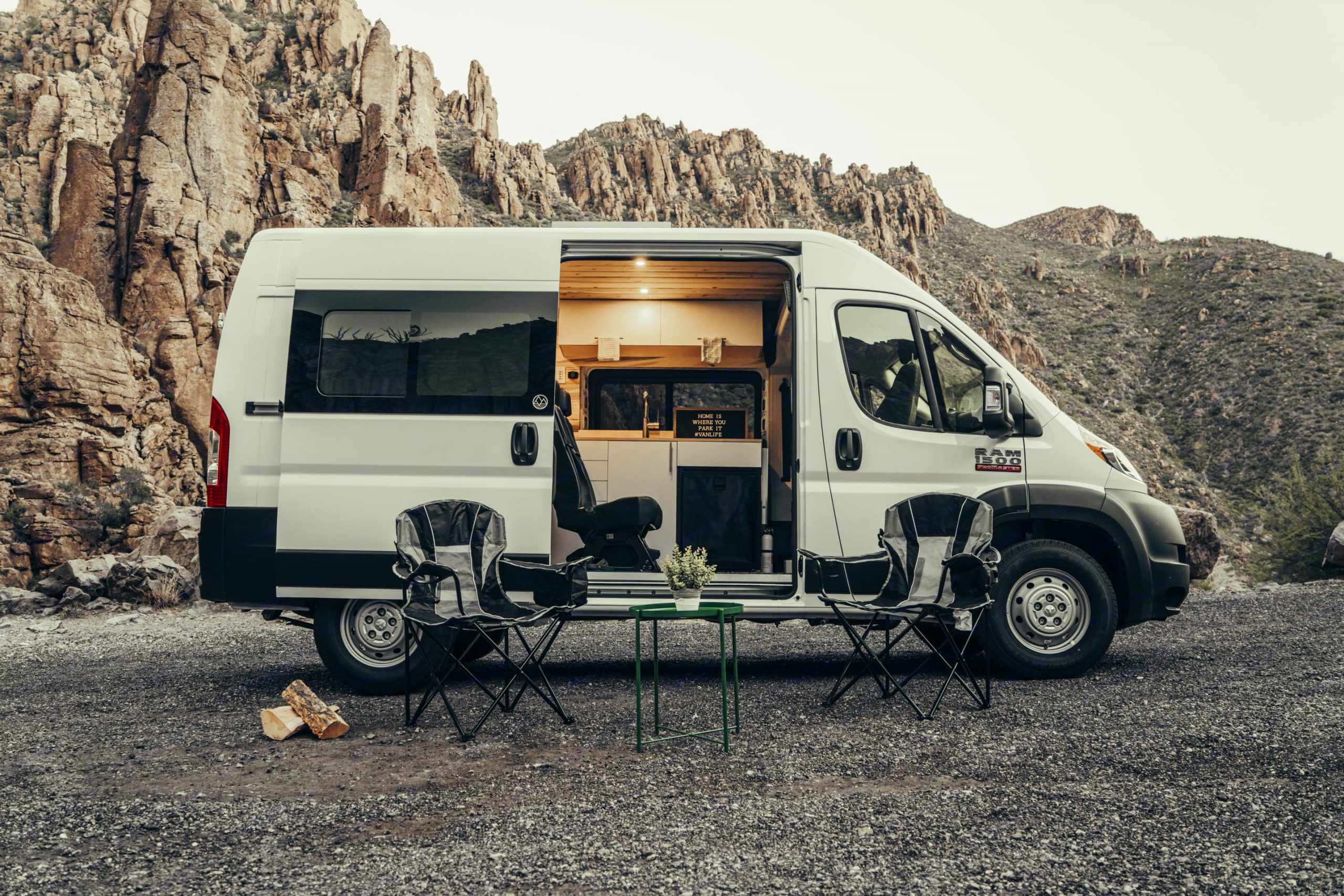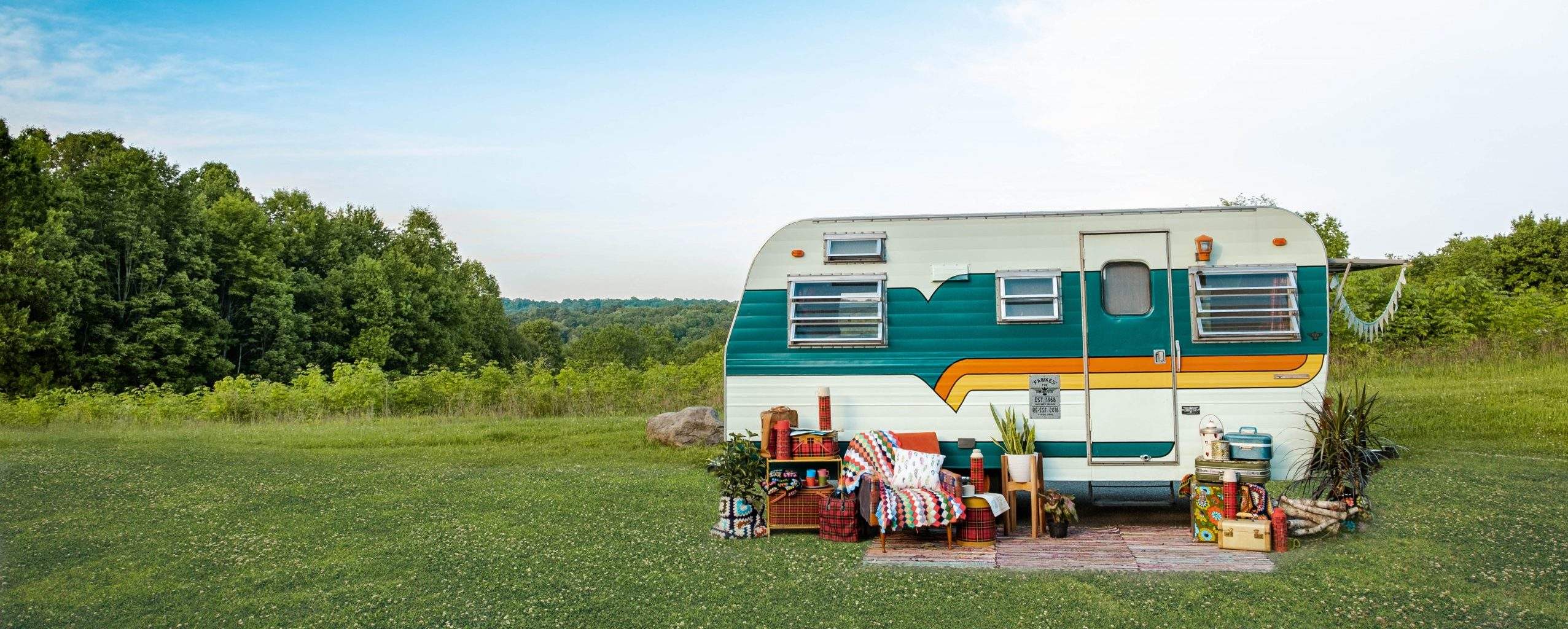Shoulder season is that time of year when we hosts usually see a dip in bookings hitting our dashboards. Fewer people camp during colder months and this has an inevitable impact on us as owners.
But this doesn’t have to spell crickets for your business — there are proven strategies to drive rental demand during the off-season.
One strategy used by many hosts is long-term rentals. This post digs into that idea and shows you several ways you could incorporate long-term RV rentals into your shoulder season plan. We’ll also hear from some owners who’ve done this successfully during shoulder season.

What Are Long-Term Rentals?
We see long-term rentals as anything rented out for 14 days or more. These can be mobile rentals where your guest takes a long road trip, stationary RV rentals that stay in one place the whole time, and outdoor accommodations like yurts and tiny homes rented out for extended stays.
Important note: Always be sure to check local tenancy/landlord laws. In some jurisdictions, stays for a certain length of time can make you a landlord. If you are considered a landlord and someone fails to pay, you may be required to evict them per the local laws and processes in that state.
Additionally, certain jurisdictions limit the length of time that individuals can be living in an RV depending on zoning.
Be sure to do your homework and consult legal guidance as needed!
Properly Vetting Long-Term Renters
It’s frustrating if you accidentally rent for a few days to a bad apple. But, as long as no damage is done to your property, you’ll usually bounce back quickly in a short-term rental situation.
Long-term renting, on the other hand, requires a special level of diligence in getting to know your prospective renter. Some states might even require you to go through an eviction process to remove a guest in rentals of 30 days or more!
That’s why it’s vital to follow steps like these when vetting long-term renters:
1. Always stay on the Outdoorsy platform — We have built-in background checks, trust and safety features (to make sure people are who they say they are), and a secure payment system to help you work with confidence.
2. Take time to get to know long-term renters — Have detailed conversations with prospective long-term renters. Get to know their background, their work ethic, their cleanliness habits, and their plans for your rig.
3. Ask for (and actually reach out to!) references — Have your prospective renter give you 2-3 character references you can reach out to. Ideally, you’d have a personal and professional reference in the mix.
Types of Long-Term Rentals
Long-term rentals can take many forms. Let’s dig into the different types so you can decide what might be the best fit for your business:
Outdoor Accommodations
Stays is Outdoorsy’s new platform for hosts of luxury tents, geodesic domes, cabins, yurts, tiny homes, and much, much more.
These types of properties can also be impacted by shoulder season slowdowns. That’s why offering glamping units as long-term rentals during the slow season can be a winning strategy.
You could rent your units under a traditional short-term lease or on a month-to-month basis to bring in recurring revenue during your slow time.
Stationary Rentals
As the name implies, these are RV rentals that don’t move during the rental period. Here’s a post we wrote that breaks out all things stationary rentals.
One big benefit of this rental type is your guest will be eligible for stationary rental insurance. This coverage is offered by Outdoorsy for the rental period and it’ll save your guest a bundle compared to mobile RV insurance.
Guests who typically look for stationary rentals include traveling healthcare professionals, construction workers, gig workers, and digital nomads looking for temporary housing.
If you have access to an RV site, you could offer the rental as an all-inclusive package so your guest is set when they arrive. Otherwise, you’d work with the guest to coordinate long-term placement of your RV.

Mobile Long-Term Rentals
Let’s say, for example, you live up north and connect with someone who’s recently started working remotely. This someone wants to try RV life for an extended period and escape South for the winter.
Let’s also say your rig doesn’t usually rent much during colder months. In that case, this could be a win-win for you both.
You get to make steady income off your rig and your guest gets to test the waters of RV life without betting the farm. You’d also have the range to make your guest a sweet deal because you won’t have to turn over your rig after each trip. The long-term rental would also bring you cash you wouldn’t otherwise see in winter.
Point is — there are people out there who’ll roll in your RV for a long period of time if the deal is right for you and them.
Rental Delivery for a Long-Term Stay
This is usually done in combination with a stationary rental where you deliver your rig to your guest’s spot of choice.
But you can also offer delivery for a long-term mobile rental if you want to expand your customer reach. For example, let’s say you sync with someone in a southern state looking to take an extended RV road trip. They might have trouble finding a local RV rental for the right price because those owners are still seeing higher demand in their warmer climates.
You could create some price arbitrage by bringing your lower-priced rig to a zone with higher prices. As a bonus, if you make the right deal, you could get paid to take a short vacation to a warmer locale while delivering your rig to your guest.
Long-Term Rental Consignment
Consignment is a process where you make a deal with someone else to manage your rental. Hosts using consignment will typically send their rig south where another owner continues managing it as a short-term rental.
But southern states can sometimes be packed with short-term rental competition.
You could give yourself a special edge by syncing with a long-distance manager who’ll help you rent your rig as a long-term rental. This could be especially promising if you get your RV into an area with a high cost of living.
Think of tourist hot spots that see droves of visitors during the winter. These places also see seasonal workers zip in for the high season seeking affordable places to stay.
If you’re not comfortable managing your long-term rental from afar, consigning it to a responsible manager could be the way to go.

Pros of Long-Term Rentals
–Easier money (usually) — Long-term rentals don’t require multiple turnovers, an abundance of communication, or constant restocking.
–Less wear and tear (as a general rule) — Stationary rentals lend themselves especially well to this. When your wheels aren’t rolling and the trailer isn’t swaying, you’re taking a dose of preventative maintenance.
–Shoulder season income — Long-term rentals can help you earn money at times when there might otherwise be none.
Cons of Long-Term Rentals
–You’re ‘stuck’ with a renter for longer — For better or worse, this renter will be a part of your life long-term and it could be difficult to remove them if you need to.
–Lower nightly prices — Long-term rentals come with steep discounts in almost all cases. The upside of this is your rig will be rented out for more nights to balance things out.
–Mobile rentals could result in more wear and tear — While stationary long-term rentals help on this front, mobile long-term rentals can see above-average wear and tear when guests have more time to roll your rig further into parts unknown.
Long Term Rental Case Studies
Disclaimer: Your mileage can and will vary here. We’re sharing these as examples of what other hosts have done to show you what might be possible.
Your location, your property, and more can all impact what you might see in your unique situation.
Multiple RVs rented out long-term
Brandon M. is an Outdoorsy owner in the Southeast who has 9 stationary RVs rented out on a long-term basis. We sat down for a quick chat with him and here’s what he shared about his setup:
1.) Where do most of your stationary rentals occur?
We mostly focus in Florida but currently have one unit in Maryland & two in Georgia.
2.) You mentioned doing disaster relief or construction housing rentals – how’d you find that niche?
I bought a unit from Servpro after Hurricane Michael to use as a rental. They had 200 units with employees living in them while working on homes in the panhandle. I realized if they needed homes then regular people did too. On top of that, I worked in new construction as my last full-time job. Lots of people owned RVs to live in while watching their homes get built.
3.) What would you see as the main pros of your long-term rentals? Cons?
Pros would be consistent income to base bills off of. Also less logistical work (e.g. fewer turnovers, fewer supplies, etc.)
Cons would be that RVs are very maintenance intensive especially if they are being used to live in full time. If something goes wrong, finding a qualified repair person in that area can be tough or impossible. This weekend for example I drove 500 miles round trip to replace a broken refrigerator since I couldn’t find a contractor to do it in that area.
4.) What additional contracts/agreements do you recommend a host have in place for this sort of rental?
Commercial insurance is a must. Minimum of $1M in liability coverage. [Outdoorsy offers this level of coverage via our stationary insurance plan]
5.) Other thoughts you’d like to share with an aspiring LT renting host?
It’s tough, but well worth the work and wear on the units.

Campervan owner offers a discount that grows with trip length
Stephen H. is a San Diego-based owner who rents out this immaculate RAM Promaster campervan. Renters taking it out for long-term trips benefit from a discount that gets better as the trip length goes up.
For example, a thirty-day trip gets the renter a hefty 33% off the rental price. You can set discounts like this for your listing via the profit plan tab in your hosting dashboard. Consider also updating your listing description to call out your discount so you draw in renters looking for the long haul.
Tiny homes and cabins as long-term rentals
Our Stays platform offers listings like this A-Frame Chalet. During high season, these listings usually serve as short-term rentals. But during shoulder seasons, it’s worth exploring if a long-term rental might be a fit.
That’s because many of these listings are nestled in popular tourist destinations where local folks might have trouble finding housing. If you have an outdoor accommodation like a yurt, tiny home, or cabin, it’s worth exploring long-term renting during your low season.
Long-term renting is a proven strategy that can keep your business rolling during the off-season. Whether you have an RV or an outdoor stay, there are people out there hunting for housing that could be a match with you. The tips above will help you discern if long-term renting should be a part of your business plan.








